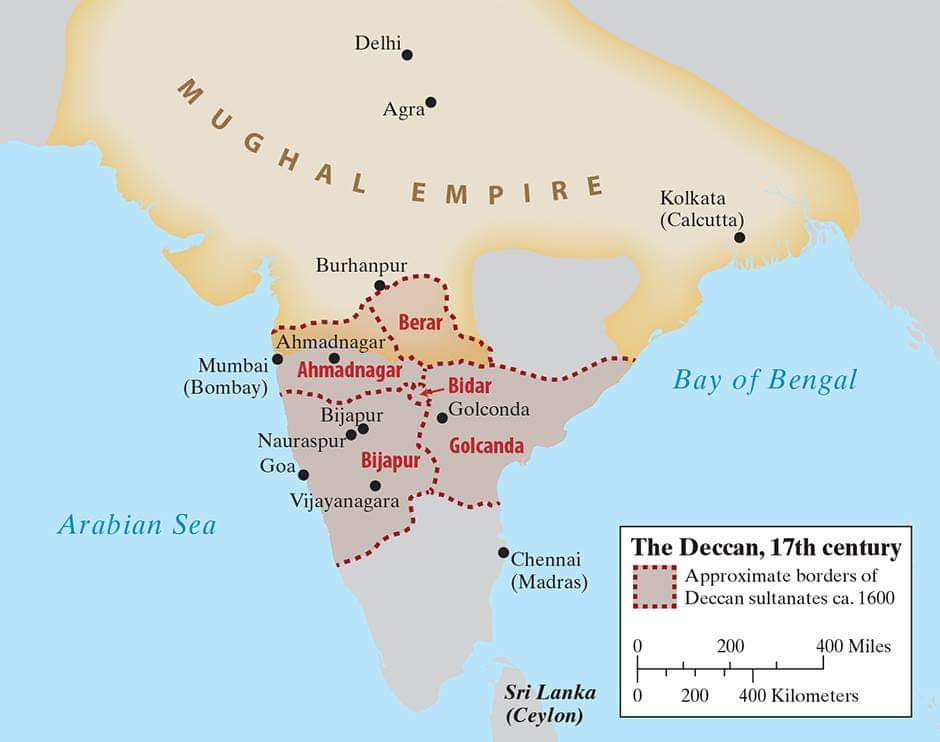Deccan is an area of great significance and an integral part of India. During Mughal period, this region played a significant place as number of new forces continuously emerged in this region. Hence, Mughal had to formulate a proper Deccan policy which brought number of gain and serious losses to Mughal empire.

Babur established Mughal empire in c. 1526 after defeating Ibrahim Lodhi at the Battle of Panipat. After that number of changes were brought by Mughals in state system in India. Babur lived for short-period of time after establishing empire and Humayun was struggled for empire for so many years and finally conquered Sur empire in c. 1555 but he died very next year and hence, both Babur and Humayun got little time for brought changes in state system. It was Akbar who consolidated the empire and brought number of changes in state system.
Also Read : Religious Policy of Emperor Akbar
Religious Policy of Mughals after Akbar
Religious policy of Mughals (Babur and Humayun)
Deccan Policy of Babur and Humayun
Babur remined busy in affairs of North India, he didn’t get opportunity to look towards south. Although he didn’t look towards Deccan but he was aware of Geo-politics of Deccan as he wrote in his autobiography that there was six Muslim states and one Hindu state in Deccan and the king of Vijayanagara was most powerful among them. Humayun conquered Gujarat by defeating Bahadur Shah and he was helped by Muhammad Shah of Khandesh.
After completing the conquest of Gujarat, Humayun warned the ruler of Khandesh but he begged for forgiveness and he was pardoned by him. After that he didn’t look towards south and later, he lost his empire to Surs. When he regains his empire, he didn’t get enough time as he died suddenly in c. 1556.
Akbar’s Deccan Policy
Akbar was the first Mughal ruler who tried to conquer as much as territories of Deccan and he was first ruler in Mughals who formulated a proper policy for that. There were number of factors that forced him to look towards Deccan like the fertile region of Deccan, many rebels of Gujarat region took shelter in kingdoms of Deccan, the challenge of Portuguese, ceremonial issues etc. were among the reasons that Akbar looks towards Deccan. And apart from all these Mughals were imperialistic rulers.

In c. 1591, Akbar conquered Sindh and after that he sent representative to these states. There were four main Deccan states during this period; Khandesh, Bijapur, Golconda and Ahmednagar. The ruler of Khandesh, Raja Ali Khan, accepted the suzerainty of Akbar in c. 1591 and hence, it came under the direct control of Mughal empire but other three states refused to do so. Akbar didn’t target the remaining states at a time.
He first planned to conquer Ahmednagar as it was nearest state geographically to Mughal empire. After proper planning, in c. 1593, a military campaign was launched against Ahmednagar and it accepted the Mughal suzerainty in c. 1596, the progress was slow due to differences among Mughal commanders. But it was a short-lived success as Ahmednagar revolted in the leadership of Chand Bibi.
But in c. 1600, Chand Bibi was killed by his opponents and the state came under the control of Mughal. When Mughals fighting against Ahmednagar, Raja Ali Khan of Khandesh died and his son, Miran Bahadur, declared independence and hence, Mughals had to fight against Khandesh as well. In c. 1601, the fort of Asirgarh was captures by Mughal army and Khandesh was annexed successfully.
Significance of Akbar’s Deccan Policy
With the help of Deccan policy of Akbar, he was successful in subjugating the state of Ahmednagar and Khandesh, although he did not succeed in subjugating the states of Bijapur and Golconda. He followed a pragmatic policy as he did not try to conquer all the states at a time. The policy of Akbar helped his successors (Jahangir and Shah Jahan) to conquer other states as well.
He conquered Gujarat which helped him to tackle the problem of Portuguese as well. The policy of Akbar helped in number of gains economically and socially as well, from the conquer region of Deccan. Hence, Deccan policy of Akbar was much success.

Pingback: Deccan Policy of Later Mughals - historylover.in
Pingback: Land Revenue System of Delhi Sultanate - historylover.in